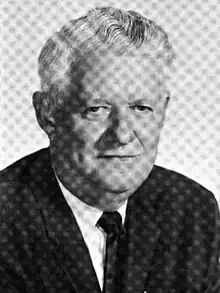Randolph Collier
Randolph Collier (July 26, 1902 – August 2, 1983) was a member of the California State Senate. He was Senator from the Second District from 1939 to 1967, and from the First District from 1967 to 1976.[1] Initially a member of the Republican Party, he moved to the Democratic Party in 1959.[2][3]
Randolph Collier | |
|---|---|
 | |
| Member of the California Senate from the 1st district | |
| In office January 2, 1967 – November 30, 1976 | |
| Preceded by | Stanley Arnold |
| Succeeded by | Ray E. Johnson |
| Member of the California Senate from the 2nd district | |
| In office January 2, 1939 – January 2, 1967 | |
| Preceded by | Henry M. McGuinness |
| Succeeded by | Fred W. Marler Jr. |
| Personal details | |
| Born | July 26, 1902 Etna, California, U.S. |
| Died | August 2, 1983 (aged 81) Sacramento, California, U.S. |
| Political party | Democratic (1959–1983) Republican (before 1959) |
| Spouse(s) |
Aida (1945–1970)Barbara Ferris Hamoui |
| Children | 7 |
| Alma mater | University of California, Berkeley |
Collier served as chairman of the California Senate Transportation Committee and was the sponsor and co-author of the Collier–Burns Highway Act of 1947, which established the California transportation infrastructure. He was chairman of the Senate Interim Committee on Highways, Streets and Bridges. Collier was an opponent of rapid transit.[4] A rest stop in Siskiyou County, where he lived nearly all of his life, is named after him,[5] as is a tunnel on the Redwood Highway, U.S. Route 199.
In 1976, Collier was defeated for re-election by former state Assemblyman Ray E. Johnson and moved to Sacramento, where he spent the remainder of his life until dying of chronic pulmonary obstruction at the age of 81.[6]
References
- "Join California - Randolph Collier". joincalifornia.com.
- California Blue Book, 1963
- New York Times - Obituary of Randolph Collier
- Inventory of the Randolph Collier Papers, bulk 1945-1955
- California Rest Stops
- Turner, Wallace (3 August 1983). "Randolph Collier, 'Father' of Coast Freeways". The New York Times.